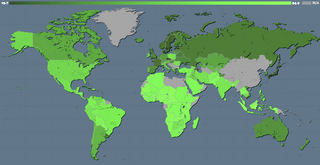Irreligion is the neglect or active rejection of religion and, depending on the definition, a simple absence of religion.
In sociology, secularization is a multilayered concept that generally denotes "a transition from a religious to a more worldly level." Most versions of secularization do not lead to atheism, irreligion, nor are they automatically anti-thetical to religion. Secularization has different connotations such as implying differentiation of secular from religious domains, the marginalization of religion in those domains, or it may also entail the transformation of religion as a result of its recharacterization.
The Oxford English Dictionary defines religiosity as: "Religiousness; religious feeling or belief. [...] Affected or excessive religiousness". Different scholars have seen this concept as broadly about religious orientations and degrees of involvement or commitment. Religiosity is measured at the levels of individuals or groups and there is a lack of agreement on what criteria would constitute religiosity among scholars. Sociologists of religion have observed that an individual's experience, beliefs, sense of belonging, and behavior often are not congruent with their actual religious behavior, since there is much diversity in how one can be religious or not. Multiple problems exist in measuring religiosity. For instance, measures of variables such as church attendance produce different results when different methods are used - such as traditional surveys vs time-use surveys.
Religion in the United States is widespread, diverse, and vibrant, with the country far more religious than other wealthy Western nations. In 2021, a large majority of Americans surveyed believed in either God (58%) or another higher power (32%). A 2023 AP survey found 72% engaged in spiritual practices such as prayer, and 63% believed in karma. Most consider themselves spiritual and religious, though there is a growing number since 1998 who describe themselves as spiritual but not religious. Christianity is the most widely professed religion, predominantly composed of Evangelicals, Catholics, and mainline Protestants. Freedom of religion is guaranteed in the First Amendment to the United States Constitution. Many scholars of religion credit this and the country's separation of church and state for its high level of religiousness; lacking a state church, it completely avoided the experiences of religious warfare and conflict that characterized European modernization. Its history of religion has always been marked by religious pluralism and diversity.
The study of religiosity and intelligence explores the link between religiosity and intelligence or educational level. Religiosity and intelligence are both complex topics that include diverse variables, and the interactions among those variables are not always well understood. For instance, intelligence is often defined differently by different researchers; also, all scores from intelligence tests are only estimates of intelligence, because one cannot achieve concrete measurements of intelligence due to the concept’s abstract nature. Religiosity is also complex, in that it involves wide variations of interactions of religious beliefs, practices, behaviors, and affiliations, across a diverse array of cultures.

Religion has been a major influence on the societies, cultures, traditions, philosophies, artistic expressions and laws within present-day Europe. The largest religion in Europe is Christianity. However, irreligion and practical secularisation are also prominent in some countries. In Southeastern Europe, three countries have Muslim majorities, with Christianity being the second-largest religion in those countries. Ancient European religions included veneration for deities such as Zeus. Modern revival movements of these religions include Heathenism, Rodnovery, Romuva, Druidry, Wicca, and others. Smaller religions include Indian religions, Judaism, and some East Asian religions, which are found in their largest groups in Britain, France, and Kalmykia.

Serbia has been traditionally a Christian country since the Christianization of Serbs by Clement of Ohrid and Saint Naum in the 9th century. The dominant confession is Eastern Orthodoxy in the fold of Serbian Orthodox Church.
Accurate demographics of atheism are difficult to obtain since conceptions of atheism vary considerably across different cultures and languages, ranging from an active concept to being unimportant or not developed. Also in some countries and regions atheism carries a strong stigma, making it harder to count atheists in these countries. In global studies, the number of people without a religion is usually higher than the number of people without a belief in a deity and the number of people who agree with statements on lacking a belief in a deity is usually higher than the number of people who self-identify as "atheists".

The predominant religion in the Republic of Ireland is Christianity, with the largest denomination being the Catholic Church. The Constitution of Ireland says that the state may not endorse any particular religion and guarantees freedom of religion.

Islam is the predominant religion in Uzbekistan.

Church attendance is a central religious practice for many Christians; some Christian denominations, such as the Catholic Church require church attendance on the Lord's Day (Sunday); the Westminster Confession of Faith is held by the Reformed Churches and teaches first-day Sabbatarianism, thus proclaiming the duty of public worship in keeping with the Ten Commandments. Similarly, The General Rules of the Methodist Church also requires "attending upon all the ordinances of God" including "the public worship of God". The Lutheran Christian theologian Balthasar Münter stated that church attendance is the "foundation for the Christian life" as "the Christian Bible and the sacraments provide the framework for the faith"; he also states that it is important for believers because it aids in the prevention of backsliding, as well as offers "the company of other believers". Until 1791, the government of the United Kingdom required attendance at church services of the Church of England at least twice a year.

Irreligion in Sri Lanka may refer to atheism, agnosticism, deism, religious skepticism, secular humanism or general secularist attitudes in Sri Lanka. The Sri Lankan national census does not provide an option for no religion.

Irreligion in Estonia pertains to atheism, agnosticism, and secularism of the people and institutions of Estonia. Irreligion is prominent in Estonia, where a majority of citizens are unaffiliated with any religion. Estonian irreligion dates back to the 19th century, when Estonian nationalists and intellectuals deemed Christianity a foreign religion in opposition to Estonian independence. Irreligion in Estonia was later accelerated by the Soviet occupation of the Baltic states, in which state atheism was enforced. By some metrics, Estonia is the most irreligious country in the world.

Irreligion in Ireland pertains to the population of Ireland that are atheist, agnostic, or otherwise unaffiliated with any religion. The 2022 census recorded that 14% of the population was irreligious; the second largest category after Roman Catholicism. The population was traditionally devoutly Catholic throughout much of Ireland's modern history, with a peak of 94.9% identifying as Catholic in the 1961 census. This percentage has declined to 69% in the 2022 census, the lowest recorded. Conversely, those with no religion made up less than 0.1% of the population in 1961; the proportion grew slowly until the 1991 census where it began to rapidly increase to its current share of 14% of the population in 2022.
Irreligion in Ghana is difficult to measure in the country, as regular demographic polling is not widespread and available statistics are often many years old. Most Ghanaian nationals claim the Christian (71%) or Muslim (18%) faiths. Many atheists in Ghana are not willing to openly express their beliefs due to the fear of persecution. Most secondary educational institutions also have some form of religious affiliation. This is evident in the names of schools like Presbyterian Boys School, Holy Child School and many others. Atheists form a very small minority in Ghana.
The relationship between the level of religiosity and the level of education has been studied since the second half of the 20th century.
Irreligion in Saudi Arabia is difficult to measure as it is illegal to leave the Islamic faith in the country. Most atheists in Saudi Arabia communicate with each other via the internet.
Irreligion in Azerbaijan is open to interpretation according to differing censuses and polls. Although Islam is the predominant faith in Azerbaijan, religious affiliation is nominal in Azerbaijan and percentages for actual practicing adherents are much lower. It is difficult to quantify the number of atheists or agnostics in Azerbaijan as they are not officially counted in the census of the country.
![Results of a 2008/2009 Gallup poll on whether respondents said that religion was "important in [their] daily life."
.mw-parser-output .legend{page-break-inside:avoid;break-inside:avoid-column}.mw-parser-output .legend-color{display:inline-block;min-width:1.25em;height:1.25em;line-height:1.25;margin:1px 0;text-align:center;border:1px solid black;background-color:transparent;color:black}.mw-parser-output .legend-text{}
90%-100%
80%-89%
70%-79%
60%-69%
50%-59%
40%-49%
30%-39%
20%-29%
10%-19%
0%-9%
No data Countries by importance of religion.png](http://upload.wikimedia.org/wikipedia/commons/thumb/7/74/Countries_by_importance_of_religion.png/550px-Countries_by_importance_of_religion.png)







